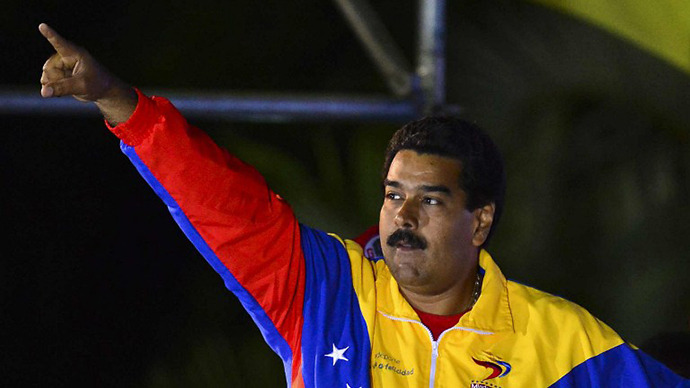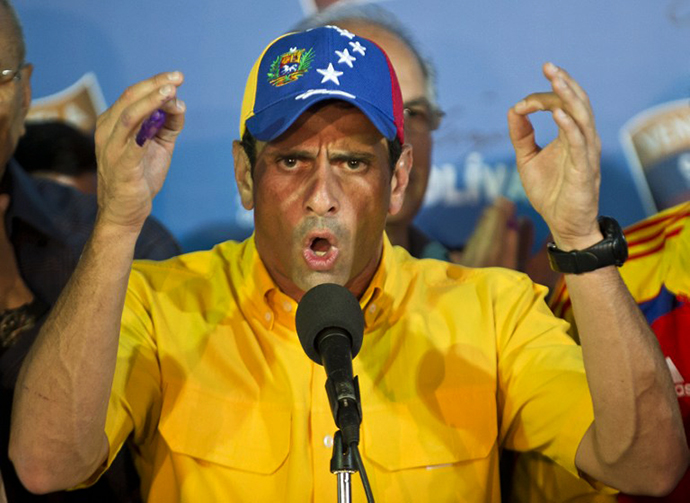‘Maduro has small window to operate’

Despite Nicholas Maduro's victory in last weekend’s presidential election in Venezuela the opposition should definitely be emboldened, Professor of Latin American History at Pomona College Miguel Tinker Salas told RT.
The author of "The Enduring Legacy, Oil, Culture and Society in
Venezuela" believes the man to substitute Hugo Chavez at the helm
the South American country, Nicolas Maduro, will have little time
to implement all the needed changes. Unless he fails to address the
problems of corruption, crime and infrastructure he could be
recalled from his post in three years.
RT:Is this victory more about Chavez's lingering popularity or was Maduro a strong enough political figure to win this on his own merit?
Miguel Tinker Salas: I don’t think you can actually separate the two. I think the two are very closely linked in the minds of most supporters of Chavez and Maduro. The reality is that you still have the impact of the popularity of Chavez and you have Maduro beginning to distinguish himself to lay fourth his own program, his own argument. And part of this argument invariably involves continuity. We have a combination of all these factors that play, and again part of the polarization within Venezuela gives us such a thin margin.
RT:Why do you think the result were so tight? The vote almost split in half, what does this tell us?
MTS: I think it tells us that there are real problems in Venezuela and Maduro will have a short period in which he has to address these issues or we’ll have a crisis within his own party and among his own supporters. He has to address head on the question of crime, the question of inflation, the question of infrastructure. These are real issues that affect real Venezuelans. And although they felt the pain for Chavez a significant number also now begin to criticize and see the need to actually carry through and implement change.

RT:The country is struggling economically, the crime rate is among the highest in the world - may be it was time for change?
MTS: I think the struggling economy is relative. Its actual debt to GDP is equal to most other countries’ in the region and actually better that in some European countries. The economic model isn’t the problem as much. Part of the major challenge is the chasm that exists between the rhetoric on the part of the government, its implementation and then the ability to carry out those programs. Yes, there is help for medical benefits, but that has to be carried out and implemented. They have to be able to complete the fight against corruption, there has to be an effort to root out crime. So there are many issues that are still pending.
RT:It's been a period of uncertainty since Hugo Chavez died last month - do you still expect a rise of opposition sentiment despite Maduro's victory?
MTS: I think the opposition will definitely be emboldened. Maduro may have a small window to operate. The Venezuelan constitution permits a recall within three years. I wouldn’t doubt it unless Maduro gets traction, addresses these issues significantly and quickly. That’s what they did to Hugo Chavez in 2004.
RT:The late President Chavez was well-known as a harsh anti-American critic. Will Maduro continue this line?
MTS: I think we are going to see the continuation of the Venezuelan foreign policy. I think there is a difference between criticizing the US and being anti-American. I think we’ll see a promotion of the Latin American policy, the promotion of a multi-polar world that is the US is not the dominant issue on the agenda. They have relations with Russia, China, Europe, Latin American countries. We’ll see the continuity of that. That’s been part of the strength promoted by the Chavez’s administration, and Maduro, we should recall, was the foreign minister in charge of Chavez’s foreign policy.
RT:An ex-army tank commander, Chavez had influence over the military and its support. With no military background will Maduro have the same control and loyalty of the army?
MTS: The team around Maduro is actually the most important issue, and it has been proven. They are part of the same team that has been around Hugo Chavez, they include military individuals, part of the coalition that was governing, part of the bureaucracy includes Gustavo Cabello, who was a member of Chavez’s group as well as other individuals who all come from the military and who now have important posts. I think we will see a continuation of that governing coalition and of that leadership body.
The statements, views and opinions expressed in this column are solely those of the author and do not necessarily represent those of RT.












